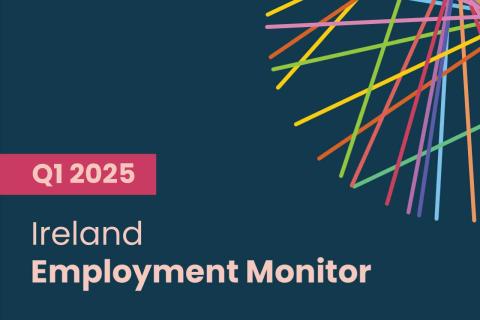The Change Management Institute, Ireland May Event: Change Through the Lens of a Leader

‘Stop trying to motivate your employees with a box of cupcakes and start to listen.’
On a lively evening at the Morgan McKinley HQ in Cork, we were treated to an open and insightful panel discussion on leading people through change.
Louise O’Rourke and Therese Walsh from the Change Management Institute (CMI) facilitated the event, which featured insights from a distinguished panel of leaders.
The panel included:
➠ Norma O'Callaghan, VP of International Revenue Operations at Forescout
➠ Chris Cashell, Change Architect at Marbral Advisory
➠ Gillian Bergin, Transformation Director at Dell.
Each panellist shared their unique perspectives and experiences, providing a comprehensive view of what it takes to implement successful change initiatives.
Key Themes
Throughout the event, several topics emerged from the discussions.
Insights into Transformational Change: Triggers and Scope
Effective Change Management: Approaches and Key Elements
Tackling Resistance to Change: Overcoming Change Saturation and Fatigue
Measuring the Effectiveness of Change: Beyond Basic Metrics
Key Learnings from Leading Change: Insights from the Panel
Insights into Transformational Change: Triggers and Scope
The evening began with the panellists describing the transformational changes that their organisations were experiencing and the related triggers. These triggers ranged from customer requirements and technological advances to investor demands and the need to simplify operations and reduce costs. Despite the varied triggers, the scope of change was similar across organisations and involved a transformation of cross-functional processes, systems, roles, data, and reports.

Effective Change Management: Approaches and Key Elements
When discussing approaches to managing change and ensuring its adoption, our panel emphasised several key elements. These included the need for clear and open communications, explaining not only how changes will occur but also why they are necessary and what will be affected. They highlighted the importance of empathetic leaders who ensure the strategic goals of any change are meaningful and relevant across all organisational levels. Additionally, approachable leaders who lead by example, and actively engage with employees to understand their feelings about the change, are crucial for successful implementation.
Tackling Resistance to Change: Overcoming Change Saturation and Fatigue
On managing resistance to change, the panel unanimously highlighted the risk of change saturation or fatigue. Companies are constantly pressured to evolve, often promoting a 'culture of continuous improvement.' Leaders who feel this strain must first understand the change themselves to communicate its importance to employees authentically.
Before doing so, they should recognise the level of change occurring across the business, prioritise change initiatives, ensure they align with strategic goals, and critically assess the need for change by asking, "Are we doing this change for the sake of it?" If the answer is yes, then it’s better not to proceed.
Leaders should focus on genuinely listening to their employees instead of attempting to motivate teams with superficial incentives like cupcakes. As one panellist suggested, you could "Solve through subtraction, not addition." Companies often try to address issues by adding new policies, processes, and procedures when instead, they should consider removing unnecessary elements to simplify and improve operations.
Measuring the Effectiveness of Change: Beyond Basic Metrics
When discussing how to measure the effectiveness of change, one of the panellists explained that finding meaningful metrics that go beyond basic adoption rates is challenging. While tangible metrics like system adoption rates are easy to measure, the more subtle shifts in organisational culture and employee behaviour require more nuanced observation and analysis. The panel emphasised the importance of behavioural change and cultural shifts as key indicators of successful change management, highlighting the need for a comprehensive approach to evaluating the true impact of change initiatives.
Key Learnings from Leading Change: Insights from the Panel

Finally, when asked to share some key learnings from leading change, the panel emphasised several important strategies:
Engaging with Middle Managers: Middle managers play a crucial role in encouraging their teams to deliver and adopt the change. Their support and involvement are instrumental for successful implementation.
Leveraging a Change Champion Network: Utilise a network of change champions to facilitate two-way communication. This network helps disseminate information and gather feedback, fostering a more inclusive and responsive change process.
Celebrating Small Wins: Recognising and celebrating small successes along the way helps keep people motivated and reinforces the positive aspects of the change.
Early Involvement of Change Managers: Having the change manager involved from the start, rather than only when resistance is encountered, ensures a smoother transition and better preparedness for challenges.
Coaching and Training: Providing coaching and training in change management skills empowers employees to handle change more effectively and confidently.
Using the 'Caterpillar to Butterfly' Analogy: Explaining that change is difficult but worth it, by using relatable analogies, like the transformation from caterpillar to butterfly, helps convey the long-term benefits of change.
Prioritising Kindness: Emphasising kindness in behaviour towards others during the change process fosters a supportive and compassionate environment.
Being Authentic: Authenticity in leadership and communication builds trust and credibility, which are essential for driving successful change initiatives.

Conclusion
Morgan McKinley and the Change Management Institute, Ireland Chapter, were honoured to host such a thought-provoking discussion, reaffirming their unwavering commitment to supporting organisations through the complexities of change. The insights shared during the event will inspire leaders to approach change with greater confidence and clarity, helping their organisations thrive in an ever-evolving business landscape.
For more information on future networking events in Cork, we value your presence and encourage you to reach out to the Morgan McKinley Tech Recruitment Team. Mark Stanton leads recruitment for Projects and Change roles in Cork and can be contacted on mstanton@morganmckinley.com.
If you have any questions about the event content or the CMI, please contact Louise O’Rourke (louise.orourke@change-management-institutue.com) or Therese Walsh (therese.walsh@change-management-intitute.com)














